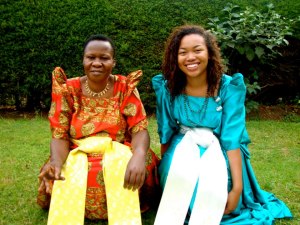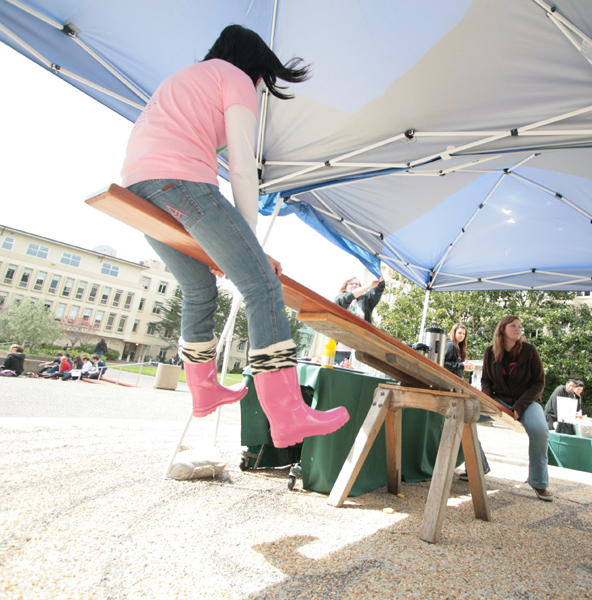
Pigs and chickens are practically staples of almost any animal farm in the world. For some, the two yield key ingredients of the quintessential breakfast. For a group of kids in Africa, these farm animals have become the ham and eggs that bring in the green — vital money resources that connect them to an education, in part, because of the help of one USF student.
From May through August, Mallory Aurellano-Browne developed a plan that allows disadvantaged youth in Uganda to generate their own income by selling livestock. She worked with 26 young people between 12 and 22 years old, all of whom had lost one or both parents to AIDS and were being raised by distant relatives.
“I didn’t want to be disrespectful and show sadness for their life stories. Instead, I knew I needed to tap into what I came there to do, and my biggest motivation was just working and playing with the kids, even if my plan didn’t work,” she said.
In her plan, the group would make a profit by breeding or raising two chickens or a pig. Pork is a popular food item in the area she worked, and Aurellano-Browne wanted to accommodate the Muslim children in her group with the option of raising hens. She bought 20 pigs and 12 chicken for about $450, giving one pig each to 20 kids, and two chickens to each of the six Muslim kids. Kids were also given a five pound bag of feed, nails and wood, and attended a pig sty building workshop.
She raised money for the supplies by promoting her project on GlobalGiving, a charity fundraising website for nonprofits.
“I was surprised — most of the people who donated were my friends, a bunch of broke college students,” she said, laughing.
Aurellano-Browne was paired up with Kitovu Mobile, an organization located in Uganda’s Masaka district that provides care and treatment to communities affected by HIV and AIDS, as part of a Sarlo Scholars’ summer program. She devised and conducted the first income generating strategy for the youth in Masaka’s Kabonera sub-county, where farming is a main source of income and food.

While the sub-county’s population is mostly made up of children under the age of 18, it’s common to find only a small percentage of them attend school. Unable to afford attending school, these individuals spend each day doing arduous tasks like fetching gallons of water, carrying wood, or making bricks. These jobs often pay about 5,000 Ugandan Shillings, or barely two US dollars, each month, which is only enough to buy food for one family.
Aurellano-Browne said although one boy wanted to make more money carrying wood, his small body frame was not strong enough to take on the heavier wood load, which would give him a higher pay.
Oftentimes, Aurellano-Browne observed many of the children had the same responsibilities as their parents or caretakers. Yet while she perceived the workload as a harsh means to make a living, this lifestyle was fairly common among the Ugandans. “Between the youth and adults, I saw a different story. For the kids, this was just the way it was, they were born into it, but the adults felt like they had no connection to their children,” she said.
When she asked the children what they wanted to do with their profit, many of them said they hoped to be able to pay for school, in addition to buying coveted, costly goods like sugar and soap to wash their clothes.
“One of the best parts of being there was seeing the kids walk with their heads held high. Seeing their transition from the beginning of my trip to the end was amazing,” she said. Near the end of Aurellano-Browne’s 10 week stay, her group raised $700. She celebrated with Kitovu, as well as local government officials, who recognized the success of her plan.
By that time, Aurellano-Browne had already been welcomed by the community she worked in, and was even dubbed with the clan name Nassali, or ‘monkey’ in Ugandan, but the first few weeks of her stay were filled with homesickness, two encounters with malaria, and being called mzungu, which means ‘foreigner’ or ‘white person’. “I’m half black, but in Uganda, I was still viewed as an outsider. The whole time I was there, it was like I was playing tug of war trying to find common ground with the people there,” she said.
Wherever she went, young children ran to her, smiling and shouting “mzungu.” She said, “In some parts, mzungus are something like celebrities. One man even said to the kids, ‘Come touch her skin. She’s just like us!’”
Though it took Aurellano-Browne some time to adjust to her new surroundings, she said from the start, her host family treated her as their own kin, a kindness she especially appreciated when she contracted malaria while on safari.
Aurellano-Browne explained that her host mother, Mama Tamale, stayed with her in the hospital for three days, ensuring she received proper care and attention in the non-English-speaking facility which had no sheets on beds and did not offer food to its patients. When Tamale had to leave, she had her distant relatives come in to keep Aurellano-Browne company.
“I couldn’t believe that she did that. I don’t think the experience would have been the same without my host family,” she said.
Though Aurellano-Browne found it challenging to live off a diet of mashed green bananas, cabbage, and tough-skinned chicken, a wardrobe of five skirts and shirts, and a television with one channel, she said she eventually learned to adapt to the new, simple life. “I realized that a lot of the things I have are unnecessary.

The communities I worked with didn’t have much, but they’re happy,” she said. In her host home, Aurellano-Browne took showers by pouring buckets and used latrines formed by holes in the dirt floor. “Now, I’m scared that I’ll get too used to my life here, and forget about life in Uganda,” she said. Getting off the airplane in her hometown of Los Angeles was surreal, and she committed a whole day to recollecting her thoughts by herself.
Aurellano-Browne hopes to return to Uganda sometime soon and continues to keep in touch with her host family through Skype. “Being in a completely differently country and being part of a community to the point where we know each other’s faces, instead of just finishing my project and leaving — that was the best experience I got out of my trip,” she said. She is currently raising funds to apply her plan to another group of 26 Ugandan youth.
For an inside look at Aurellano-Browne’s work in Masaka, Uganda, check out her blog at ninethousandthreehundredand1.blogspot.com, which is named after the distance in miles between Uganda and San Francisco.






